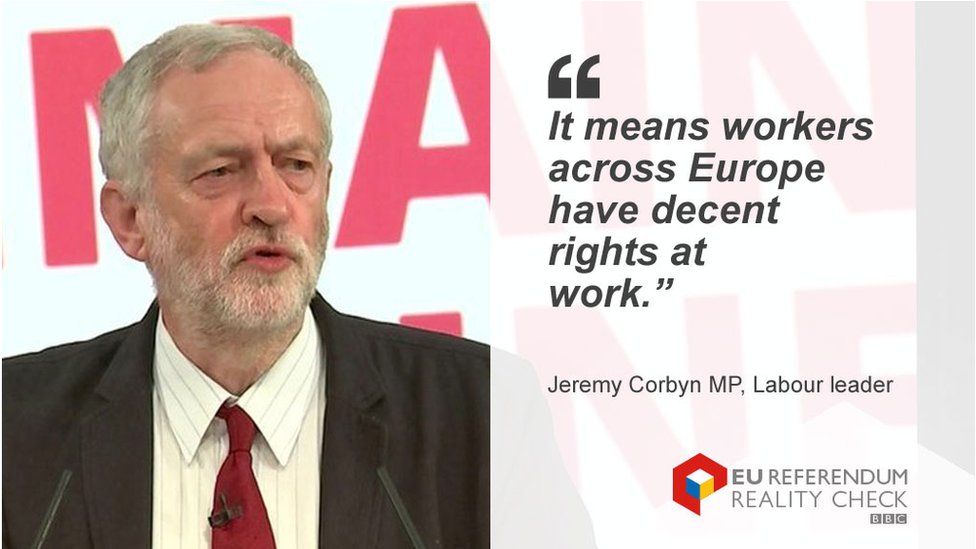Reality Check: Does the EU protect workers' rights?
- Published

The Claim: Speaking about the UK's membership of the EU, Labour leader Jeremy Corbyn said: "It means workers throughout Europe have decent rights at work, meaning it's harder to undercut terms and conditions across Europe."
Reality Check verdict: Some of the UK's employment law comes from the EU. However, the impact a Brexit might have on workers' rights and protections depends on which existing laws the UK decides to keep or get rid of.
In a speech at the Institute of Engineering Technology on Thursday, Jeremy Corbyn said British workers benefited from a host of rights and protections because of the UK's membership of the EU.
Among other things, he said the European social chapter and other EU directives had secured:
- 28 days of paid leave and a limit on working hours for more than 26 million employees
- Eight million part-time workers being given equal rights with full-time colleagues
- Guaranteed maternity leave rights that are used by 340,000 women every year
Let's start with paid leave. Some voices on the Remain side, such as the Trades Union Congress (TUC), have warned that holiday pay would be at risk if the UK decided to leave the EU.
Workers in the UK are entitled to five weeks and three days of paid holiday a year (including public holidays). The Working Time Regulations of 1998 guarantee four weeks of paid leave as a European minimum. But for 35 years before joining the EU, the UK had legislation on paid holidays, so this is unlikely to be affected. You can read more about this here.
Other voices on the Remain side have repeatedly linked benefits such as women's rights to EU membership. For example, the right of part-time workers to join occupational pension schemes was determined by rulings of the European Court of Justice (ECJ), which found that excluding them constituted indirect sex discrimination.
Find out more here about why we said that the EU had been influential in guaranteeing women's rights in the workplace - but they would not necessarily be in jeopardy if the UK left the EU.
It's also fair to say that the UK has, on some occasions, gone further than the EU in guaranteeing workers' rights, for example, in the case of maternity leave.
The 52 weeks of statutory maternity leave in the UK is considerably longer than the 14 weeks guaranteed by EU law. Of this, a period of 40 weeks is available for shared parental leave.
One controversial aspect of EU employment regulation is the EU's Working Time Directive. Some want to limit its application, which governs the hours employees in the EU can be asked to work. This must not exceed 48 hours on average, including any overtime. The Open Europe think-tank has listed it as the third most costly EU regulation.
The overall effect a Brexit might have on workers' rights is one of the most common questions that we get asked.
In short, if the UK votes to leave the EU on 23 June then the UK government would have to choose which EU laws to keep, change or get rid of. So, in theory, some rights could be lost but trade unions, the Labour Party and many Conservatives could also oppose any such move. We've answered a question from a reader about workers' rights in more detail here.
- Published22 February 2016
- Published10 May 2016
- Published9 May 2016
- Published31 May 2016